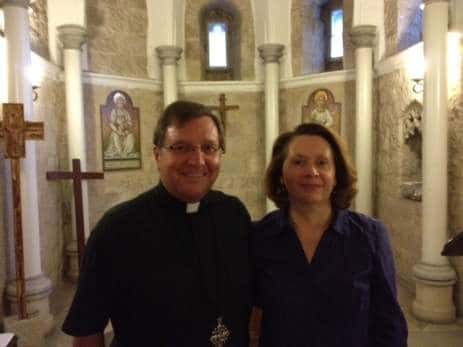A letter of Thanksgiving from John Organ in Jerusalem
Dear Friends,

I am grateful to Archdeacon Fletcher for his invitation to write a few words for the Anglican Ordinariate Newsletter about life here in Jerusalem.
Recently, a long established and important Christian aid organization known as Biblelands changed its name to Embrace the Middle East, which is quickly becoming known as “EmbraceME.” The organization changed its name for several reasons and decided upon its new name based on Mark 9:37, where Jesus took a child in his arms and said, ‘Whoever embraces this child embraces me and not only me but also God who sent me.’
Nearly two months have passed since my wife, Irene, and I arrived in Jerusalem. We are embracing the Middle East, learning day by day, and coming to love the indigenous people that until now we have known only superficially.
For one entire month of those two it was the Muslim Holy Month of Ramadan. Friday after Friday, tens of thousands of Muslims from the West Bankpoured out of buses and flowed by our apartment on their way to the Temple Mount/Haram Ash-Sharif to worship. The daily Ramadan fast was broken each evening, generally around 1930 hrs, with the sound of the Ramadan Cannon, which sounded all across Jerusalem giving permission to Muslims to break fast. Ramadan ended with several days of celebration. Shops did bustling business as the narrow streets of Jerusalem filled with happy, joyous Muslims celebrating their faith.
Friday evening and Saturday we naturally become part of Sabbath observance. Stores are closed and the Jewish community becomes still, except inside synagogues and at the Western Wall, Judaism’s holiest site. Irene and I have spent several Friday evenings at the Western Wall, respectfully well to the back, and sharing in the worship of the Jewish faithful. One evening in particular the square was filled with literally thousands of worshippers, many hundreds of whom were Jewish youth dancing and singing. Under what has to be one of the most beautiful skies in the world, both during the day and at night, the Western Wall on this occasion was a place like no other and one felt at the deepest level that there simply was no better place to be than at this holy place on this Sabbath evening.
As we live just 10 minutes from the Old City of Jerusalem, Irene and I walk frequently to sites historically identified with our Lord’s life, death, resurrection and ascension. We have gone to the Holy Sepulchre and stood in line with hundreds of others waiting to enter the tomb where tradition says Jesus was laid to rest. Christian pilgrims have been coming to this tomb since the Fourth Century – indeed, since the time of the resurrection as there is evidence suggesting the site was never forgotten or lost to indigenous Christians. There have been times when Irene and I have gone to the tomb late in the evening and found no lineups at all and we have been able to go immediately into the tomb. On those occasions we can meditate unhurriedly upon those very first disciples who came to the tomb and upon the holy mystery of our Lord’s death and resurrection.
Being among and sharing in the religious life of the Children of Abraham is one of the great blessings of Jerusalem Every day thousands of people from each of the three faiths live and worship side by side. It is a city on a hill, a Holy Hill in fact, and to it come all the nations of the earth.
As a priest of the Diocese of Jerusalem, I am privileged to meet indigenous Christians. My bishop, the Rt. Revd Suheil Dawani, is an Arab Palestinian. I have travelled with the bishop throughout the West Bank and Israel as well as Jordan. Irene has joined us on a number of these occasions. We have been honoured to enter into the lives of the local people, to meet the Living Stones of the Holy Land, and come to know them warmly as our brother and sister Christians and Anglicans. Indigenous Christians have become a very small minority within the Holy Land, and in fact throughout the Middle East. This is unfortunate as there has been an important presence of indigenous Christians here since the first Pentecost. The Archbishop of Canterbury, the Anglican Church of Canada, the Episcopal Church in the United States, and indeed the entire Anglican Communion, as well as sister Christian Churches, have taken seriously the need to support the continuation of the indigenous Christian presence in the Holy Land and the Middle East.
These two months have flown by. Each day is filled with a wide variety of ministry activities. There are always visitors to greet, messages to prepare, official functions to attend, Eucharists and Evening Prayer to attend or preside at, schools and hospitals to visit, clergy conferences to participate in, funds to raise, and fellowship to enjoy. Stamina is needed. My military formation in physical fitness serves me well as each morning at 0630 I run around the Old City of Holy Jerusalem, pass the Mount of Olives, up Mount Zion, down to Gehenna, up to Jaffa Gate, around to Damascus Gate, and down Nablus Road to home. Irene keeps fit by our walks and occupied by volunteering at St. George’ sSchool, where she helps the children with learning English.
We miss Canada. We miss our family. We are grateful though to be here.
I will be forever thankful for my time with you and with the Canadian Forces Chaplaincy. Whatever strengths and maturity I now have, have come from being one of your colleagues.
Peace, Shalom and Salaam!
Irene and John
Interested in keeping up-to-date on news, opinion, events and resources from the Anglican Church of Canada? Sign up for our email alerts .
